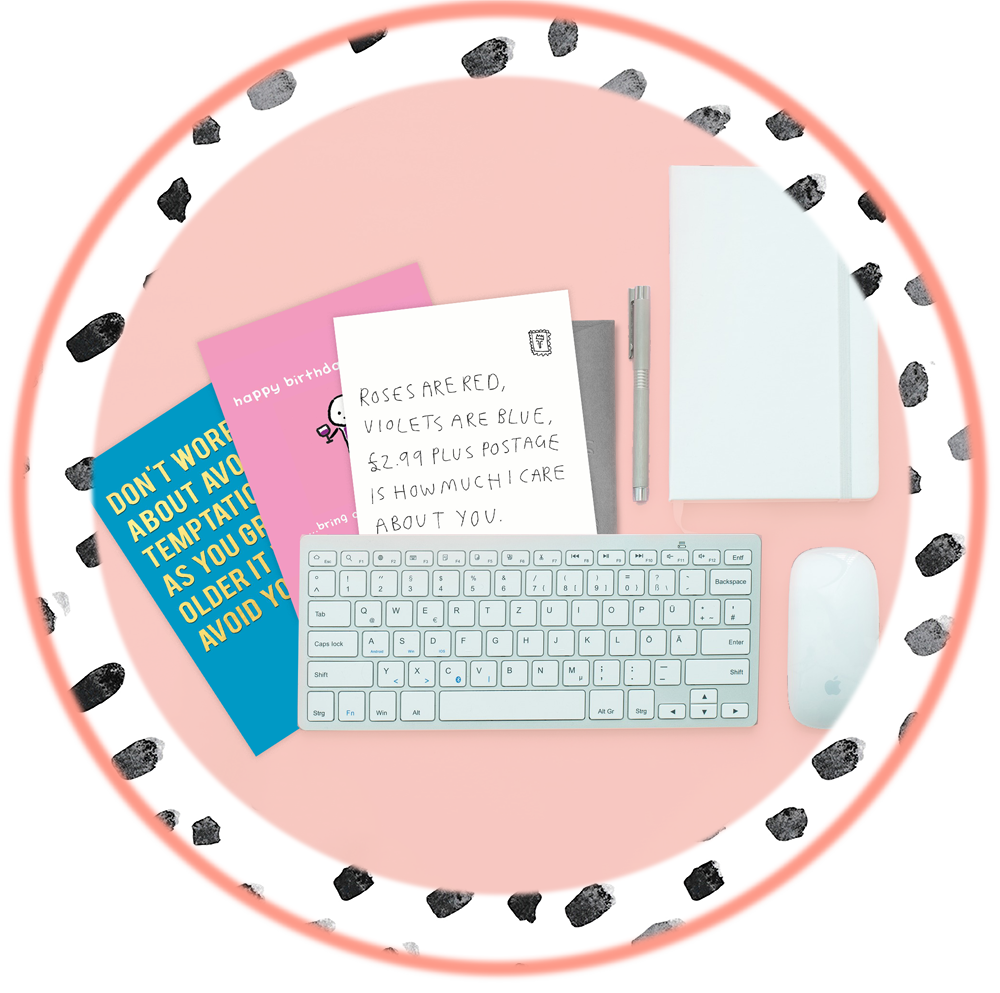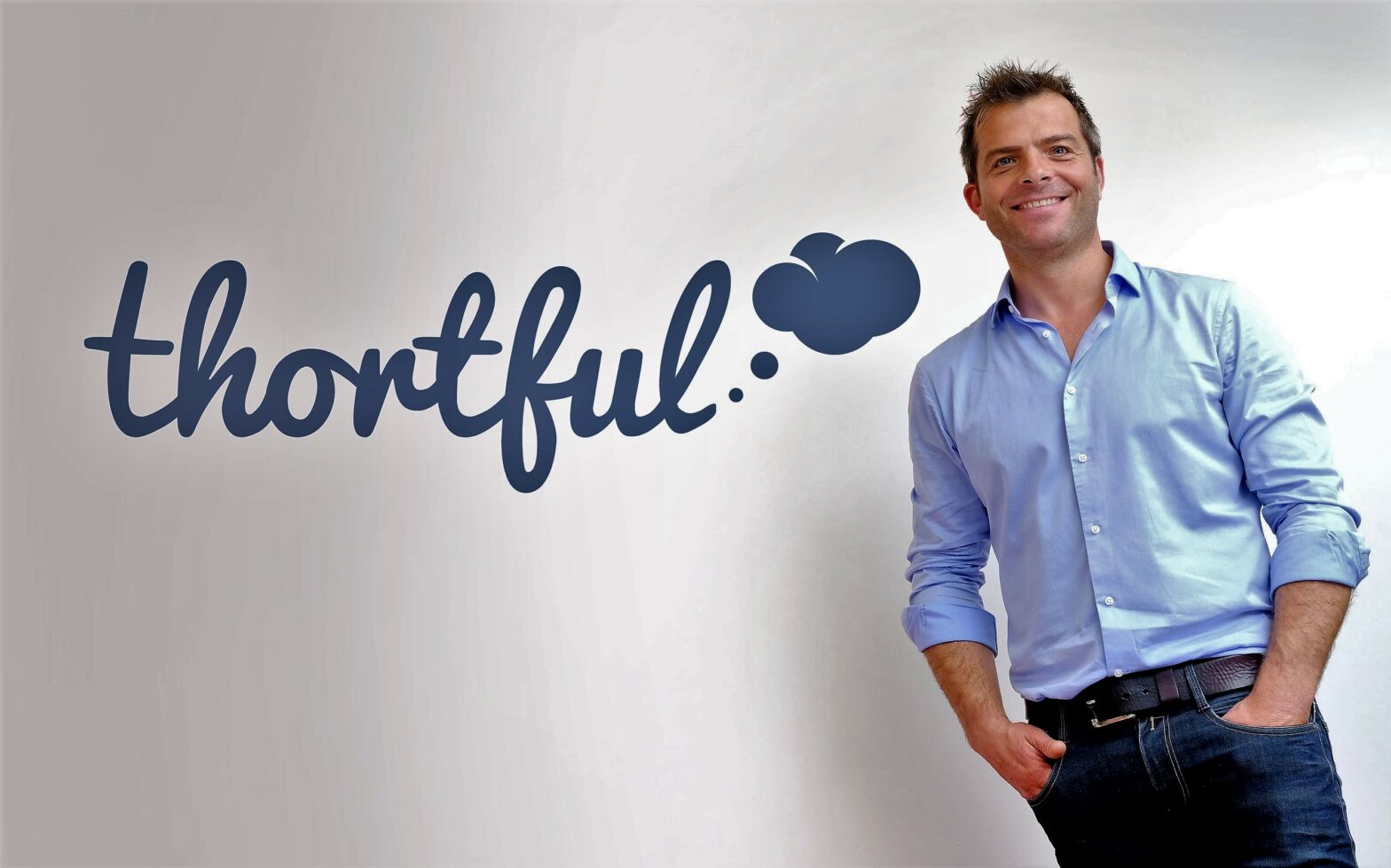“Dad, no matter what life throws at you, at least you don’t have ugly children.” So reads one of the 40,000 quirky cards in Thortful’s database. The online greeting card company launched in June 2016, led by serial entrepreneur, Andy Pearce and his vision to ethically disrupt the UK’s £1.7 billion greeting card market. “The UK market is the biggest in the world, but only 5 per cent of cards are ever bought online,” Pearce tells GrowthBusiness. High street card companies still operate on the age-old model of ordering designs six to 12 months ahead of time, while card designers work behind the scenes. Thortful’s model places the creators at the heart of the content, and pays them four times the industry average, says Pearce.
“Thortful is a mechanism to allow creators, graphic artists, and photographers new way to sell their designs. It’s about the recognition. We have a team that works with these creators to get their designs more in line with what sells, and right now, we pay the artists the most in the industry. For the first time, a card company is putting creators first, which is why around 70 per cent of creators on our platform are exclusive to us,” he adds.
The company started out by building the technology around two years ago. Since its launch in June 2016, Thortful has grown to host around 1,500 creatives on the platform and serve over 125,000 customers. While it holds over 40,000 designs in the database, around 12,000 are catalogued for featured designers, working like an online storefront promoting their work. Knowing what sells took some trial and error, according to Pearce. “Originally, we actively went after creatives and looked at people who would sell. But our customers have evolved since then. We thought much more artsy work would sell, but the most popular cards are cheeky, funny cards that take the mick out of the recipient. The most important things is that it be relatable, and having a massive catalogue online helps.”
“Companies like Moonpig have brought the option of buying cards online to the public, but it’s almost always about personalisation. Our aim is to change customer perceptions. It’s not about hyper-personalising cards or mugs, but about bringing relatable, intelligent, reactive cards. High street card retailers order their cards so far in advance, it’s virtually impossible to find contemporary cards. We’re online so we can respond to world events very quickly. For example, we had Brexit cards and Trump cards out within 24 hours of those events.”
Thortful takes a concept or meme from something online into something tangible that can sell. The company follows online trends, and colour palettes to work with creators in advance. “We’re a community, so it’s all about giving feedback to creatives on what is working and what is not. Customers come online, buy a card and send it to their friends and family, but what we’re noticing now is that’s just around 30 per cent of our business. Most of our sales are from people who buy multiple cards for themselves to use whenever the need arises,” Pearce adds.
Creators are paid 50p per card sold, and 40 per cent of gross profit goes to the company. “It’s a very hard market, because it’s a volumes game. We’ve got to sell thousands of cards to make profit. So we started thinking about what else we can produce using our designs, such as keepsake cards, notebooks with printed messages, gift boxes that are a gift and card in one.”
The run up to father’s day was the most busy period for the company, with over 10,000 cards ordered per day. According to Pearce, it’s a reminder of the need to scale. “We outsource our printing and the company has the ability scale up. When we get a higher run rate, we’ll outsource the printer using technology to scale. Over the next 12 to 24 months, growth is going to be key. We’ll break even in around eight months’ time, and that’s always good. After we take it to profitability, the next milestone is for us to be the UK’s largest online card retailers, while still paying creatives well for their work,” Pearce says. His end goal is to eventually sell the business for around £40 million, once he’s built it up as a market leader.

Scaling and then Exiting Companies
Having launched, grown and sold three very distinct businesses to date, Pearce is no stranger to scaling and exiting growth companies. “I was born and brought up with the idea I’d always work for myself. Throughout my school years I was cleaning shoes and running a tuck shop. I wasn’t really into school. All I wanted to do was get out in the world,” he says.
At age 18, Pearce was running a highly successful business, Bin Clean, which focused on a neglected market; wheelie bins. With the help of friends and family dropping leaflets and spreading the word, Pearce grew the company to the point it was franchised across the country. “I was earning £48,000 a year at 18, but it wasn’t really about the money. No one was cleaning wheelie bins back then. I knew I had to move on once the bank wouldn’t lend me the money to scale. Later on, the same manager who turned me down then came to see me when I was turning over £7 million a year. That was a sweet moment,” he adds.
Eventually, he realised he couldn’t grow Bin Clean any further so he sold the business and set up a call centre after taking up a temporary job at a call centre in the past to make a little extra money. “Call centres back then were more about getting bums on seats than giving quality help. I realised that companies can achieve a lot of great results if you focus on quality. I set up the business, Inkfish, with £25,000 and seven years later, we became the seventh largest in the UK.”
The key for Pearce was in reinventing what the call centre business meant. He invested in people and quality control, and Inkfish’s clients included Sky, Renault, O2 among others. At its height under Pearce, Inkfish employed 2,700 people and was turning over £26 million. “One of our customers, an insurance company, liked business so much, they bought it for £12 million. I was on the group board for three years, but it was absolute hell,” says Pearce.
“Before (the acquisition), we could do whatever we wanted, whenever we wanted. It was like going from a speedboat to an oil tanker. Plus there was a lot of animosity towards me because I was only 30 years old at the time. There’s so much negativity in large organisations, it can really suck the life out of you.”
Off the back of that, Pearce stumbled across conference calling, which set the wheels in motion for his next big idea; Powwownow.
Recruitment the key success
“Conference calling is a very basic service but it was so expensive. We took the American model and adapted it for the UK and Europe, but it was a real slog for us to get it going. We were solving a problem people didn’t know they had. If you work for big companies, you’d conference call. If you work for an SME, you didn’t. But with the rise in popularity of remote working, it opened conference calling up to a massive market,” Pearce says. He built and grew Powwownow for 10 years, and sold it to PGI for $37.8 million. But that was life before Thortful, he says. “The reason I’ve been so successful is through my recruitment. When you get the right people on board, it’s important to look after them. For me, it’s that entrepreneurial spirit, the get-up-and-go, that makes the biggest difference. The people I hire need to be willing to go along for the ride. A lot of entrepreneurs are scared of employing people better than them. But it’s not about competing with your team. It’s about empowering them and rewarding them. And that doesn’t need to be monetary. When you’re starting out, you can’t afford big bonuses. Simple rewards like a night out on the company shows your team they are appreciated,” he adds.
“Ultimately, I do it for the people. I’ve never created a business focussed on how much money I’d make out of it. At my previous company, we’d hire some people off the streets who haven’t had a job in more than two years. Some would work out, and some wouldn’t, but it’s about trusting your hires and trusting your instincts.”






